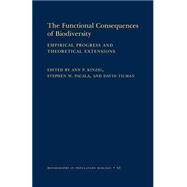- ISBN: 9780691088228 | 0691088225
- Cover: Paperback
- Copyright: 1/28/2002
Does biodiversity influence how ecosystems function? Might diversity loss affect the ability of ecosystems to deliver services of benefit to humankind? Ecosystems provide food, fuel, fiber, and drinkable water, regulate local and regional climate, and recycle needed nutrients, among other things. An ecosyste's ability to sustain functioning may depend on the number of species residing in the ecosystem--its biological diversity--but this has been a controversial hypothesis. There are many unanswered questions about how and why changes in biodiversity could alter ecosystem functioning. This volume, written by top researchers, synthesizes empirical studies on the relationship between biodiversity and ecosystem functioning and extends that knowledge using a novel and coordinated set of models and theoretical approaches. These experimental and theoretical analyses demonstrate that functioning usually increases with biodiversity, but also reveals when and under what circumstances other relationships between biodiversity and ecosystem functioning might occur. It also accounts for apparent changes in diversity-functioning relationships that emerge over time in disturbed ecosystems, thereby addressing a major controversy in the field. The volume concludes with a blueprint for moving beyond small-scale studies to regional ones--a move of enormous significance for policy and conservation but one that will entail tackling some of the most fundamental challenges in ecology. In addition to the editors, the contributors are Juan Armesto, Claudia Neuhauser, Andy Hector, Clarence Lehman, Peter Kareiva, Sharon Lawler, Peter Chesson, Teri Balser, Mary K. Firestone, Robert Holt, Michel Loreau, Johannes Knops, David Wedin, Peter Reich, Shahid Naeem, Bernhard Schmid, Jasmin Joshi, and Felix Schlauml;pfer.







